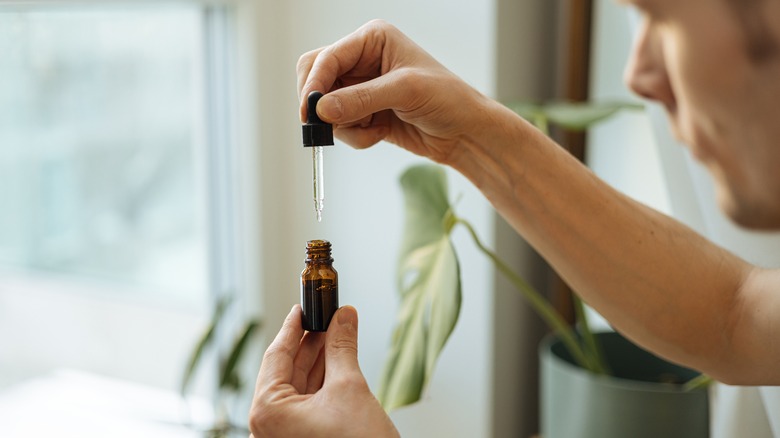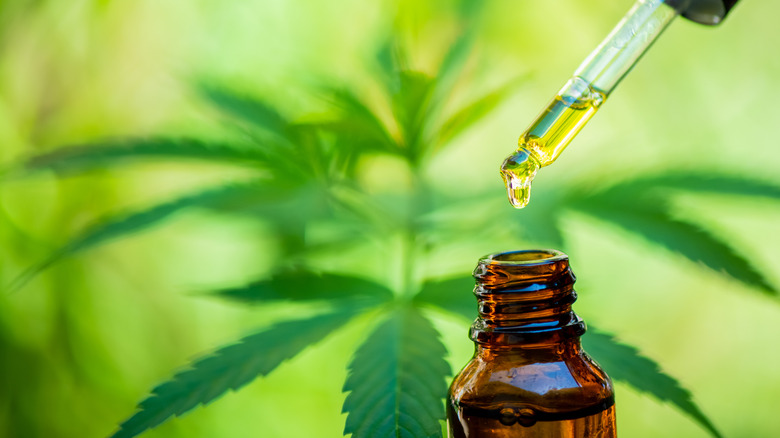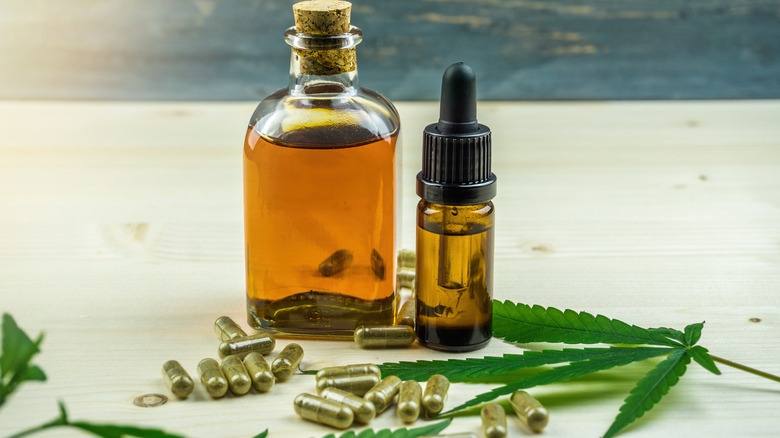Can CBD Help Treat PTSD?
If you've heard about CBD, but still aren't quite sure what it is or what it does, you are not the only person with questions. It's been presented, especially as of late, as a catch-all aid for many of life's ailments, and has even been presented as a method to help with sleep, depression, and more. But what's the 4-1-1 on this trendy wellness product?
CBD, or cannabidiol, is a very specific chemical that can be found within marijuana, but it doesn't contain tetrahydrocannabinol (THC). THC, of course, is the component of weed that causes the "high," making CBD its calmer, less severe cousin. More common in the last decade, CBD has been used to help treat people with all different types of issues, with celebrities such as Kim Kardashian, Emma Roberts, and Kristen Bell confessing that CBD works wonders for them (Marie Claire). But with all that in mind, does CBD help those suffering from post-traumatic stress disorder?
According to the Mayo Clinic, post-traumatic stress disorder, or PTSD, is known by many as a disorder many veterans suffer from. Despite said-status, PTSD can occur in any person who has undergone a formidable event or experience. Symptoms of the disorder can materialize as panic attacks, nightmares, uncontrollable thoughts, or flashbacks, and sadly, there is no full cure. With psychiatric medications, those suffering from PTSD and its impacts have been able to develop coping mechanisms, but as science and medicine is ever-evolving, doctors are hoping to find a link between CBD and alleviating symptoms for those struggling.
The verdict on CBD as treatment for PTSD is mixed
While CBD and its derived products have been linked to aiding sleep, anxiety, depression, and more, it still begs the question: Can CBD help those struggling with PTSD? The answer is long and complex, but we're here to break it down.
In 2019, The New York Times released an article linking to a study conducted, primarily focusing on CBD and its connection to those battling PTSD. The double-blind study found, after studying the effects, that there was not enough evidence to sufficiently conclude that the marijuana-derived product positively impacted PTSD victims. An additional study cited, which looked at CBD's impacts on 11 people, did discover that the product was able to slightly reduce the symptoms.
Despite the varying results, a study published by the National Library of Medicine (NIH) found that, "No clinical trial evaluating the effectiveness of CBD in reducing symptoms of PTSD in humans has been completed," leaving a rather large question mark regarding the product and PTSD patients. So does that mean that all hope is lost for PTSD victims who are looking for some relief?
CBD has been linked to aiding in other mental health struggles
While there isn't a definitive link between CBD and PTSD, for now, the marijuana-sourced product has been found to be helpful in the treatment of panic attacks, REM sleep, and uncontrollable thoughts, some of the aforementioned symptoms of the disorder.
Let's start with panic attacks. A study conducted in 2011 analyzing CBD's impacts on anxiety found that the substance decreased symptoms in those diagnosed with social anxiety disorder, and yet another study review conducted in 2015 found that CBD could assist those battling panic disorders, obsessive-compulsive disorder, and (ding, ding, ding) PTSD. As for aiding in sleep, a 2012 study concluded that CBD "efficiently blocked anxiety-induced REM sleep suppression," assisting those struggling and helping them to get that much needed rest. As for uncontrollable thoughts, a study conducted in 2020 — focusing on patients with OCD — found that CBD reduced intrusive thoughts by 49%. While PTSD and CBD haven't been as concretely linked and researched as some of these aforementioned issues, it could be estimated that the products could alleviate some issues derived from the disorder.
However, as with any medical decision, it's a good idea to have a discussion with your doctor before introducing CBD into your life as a possible assistant for your PTSD symptoms and struggles.
If you or someone you know is struggling with mental health, please contact the Crisis Text Line by texting HOME to 741741, call the National Alliance on Mental Illness helpline at 1-800-950-NAMI (6264), or visit the National Institute of Mental Health website.


